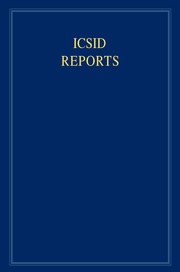No CrossRef data available.
Article contents
Karkey Karadeniz Elektrik Uretim A.S. v. Islamic Republic of Pakistan
Published online by Cambridge University Press: 01 January 2021
Abstract
Defence — Corruption — Evidence — Standard of proof — Burden of proof — Whether an allegation of corruption must be supported by clear and convincing evidence or on the ordinary balance of probabilities — Whether the burden shifted once the allegation was supported by prima facie evidence — Whether circumstantial evidence could be explained or instead shifted the burden of proof
Jurisdiction — Legality — Municipal law — Judicial act — Arbitrariness — Whether the investment was made in conformity with municipal law — Whether issues of municipal law decided in the judgment of a superior court were binding upon an international tribunal — Whether violations of municipal law by officials precluded the State relying on the judgment — Whether the judgment was arbitrary under international law — Whether the State could in an international tribunal rely on judicial findings which it was seeking to overturn
State responsibility — Attribution — State-owned entity — Contract — Whether the contractual conclusion and performance of a State-owned energy company was attributable to the State — Whether contractual disclaimers were relevant to attribution
Jurisdiction — Investment — Legality — Fraud — Contract — Municipal law — Whether the investor procured the investment through contractual promises it knew it could not perform — Whether changes made to the contract contrary to municipal law precluded jurisdiction
Jurisdiction — Investment — Contract — ICSID Convention, Article 25(1) — Salini test — Whether the contract was akin to a sale of goods or qualified as an investment — Whether the investor contributed significant capital with substantial duration, took a reasonable risk on the transaction, and contributed to the economic development of the State
Expropriation — Indirect expropriation — Contract — Judicial act — Substantial deprivation — Whether contractual rights were capable of expropriation — Whether the municipal judgment of a superior court deprived the investor of the use and enjoyment of its contractual rights
Free transfer — Physical assets — Whether the guarantee of free transfer extended from funds to include physical assets — Whether the detention of vessels fell within the scope of the State’s obligation — Whether the detention prevented the investor from selling and transferring proceeds
Remedies — Damages — Standard of compensation — Expropriation — Standard of proof — Valuation date — Valuation of contractual rights — Repairs costs — Replacement costs — Lost profits — Increased costs — Wasted costs — Whether the investor was entitled not only to losses suffered but also lost profits — Whether damages had to be proven with certainty or merely with a sufficient degree of probability — Whether ex ante or ex post valuation was the appropriate starting point — Whether the investor was entitled to recover the lost earning capacity of detained vessels — Whether the investor was entitled to recover the cost of delays to its operations in other States
Remedies — Interest — Contract — Whether interest should be charged at the contractual rate on delayed payments or borrowing costs
Jurisdiction — Counterclaim — Consent — Whether the investor consented ipso facto to counterclaims in exercising its right to arbitrate — Whether the BIT contemplated the possibility of counterclaims
Costs — ICSID Convention, Article 61(2) — Costs follow the event — Party conduct — Reasonableness of costs claimed — Whether party conduct or the reasonableness of the costs claimed weighed on the principle that costs follow the event — Whether the State failed to cooperate in good faith in the proceedings — Whether the legal expenses claimed by the investor were reasonable
- Type
- Case Report
- Information
- Copyright
- © Cambridge University Press 2020




